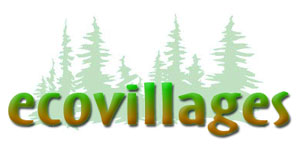Introduction to Ecovillages
- To learn about our style of ecovillages, go here: Ecovillages Our Way.
- To find out more about our first ecovillage project, go here: Silvergreen.
Up until now, ecovillages have been something of an oddity, perhaps one step removed from a hippy commune. The type of place where you might find what we call in Australia "ferals" - a place where things like sports cars, bacon and personal hygiene are frowned upon. But no longer! Ecovillages are undergoing a renaissance, and are gaining the attention of the middle-to-upper-class home-buyer. As the market shifts its preferences towards environmental products and services, property developers are reacting accordingly, and "green developments" are appearing everywhere.
Of course, not all so-called "green developments" are ecovillages. Some are no more than your usual over-crowded suburban white-picket-fence housing estates, just with low-flow shower heads installed. But to be fair, many new developments are being put together by people who genuinely care for the environment and want to make a difference.
What is an "ecovillage", anyway?
An ecovillage is a housing development in which there is a high degree of consideration for the environment, sharing, co-operation and community interaction. Usually there is a sense of "custodianship" of the land, with a large percentage of the land (often 100%) owned collectively by all the residents. Unlike many housing developments, only about 20-25% is allocated for housing lots, the remainder being preserved in (or rehabilitated to) its natural state and/or allocated for community use such as food production and shared buildings.
Community buildings may include a meeting place, hall, farm buildings, workshops, school, conference centre, even shops. Permaculture is a common feature, with the community seeking to produce a large percentage of its food requirements. Ecovillages also typically produce most of their energy requirements, recycle their water and incorporate water-saving technologies. Building with recycled or local materials and recycling of waste is also fairly standard, and many ecovillages engage in arts and crafts or provision of consultancy services in order to generate income. Some ecovillages pool their income. Some ecovillages do not allow cars, and many do not allow dogs or cats.
The general principle is to live lightly on the land, with as small an "ecological footprint" as possible.
But ecovillages are not only about the environment - unless you include humans in your definition. Ecovillages also seek to address certain social issues caused by the way of living that many of us have become used to. In modern city life, the "nuclear family" has fractured even further, with many of us living in virtual isolation, a situation that often leads to emotional distress and even depression. The residents of an ecovillage, on the other hand, essentially become part of an extended family. They have shared activities and responsibilities, such as construction projects or taking care of animals or gardens, which keeps people interacting with each other. They also have regular "village meetings" in which decisions about the community are made by all the residents. Feelings of helplessness and isolation are rare in this kind of environment, where there is always someone to chat with or play with, and everyone has a say in how their immediate environment is evolving.
So, ecovillages help Earth, and they help us - they are quite simply the absolute best way we currently know of to live on Earth in a way that is sustainable and conducive to positive human development.
Further reading: Wikipedia article on ecovillages
The traditional approach
Once I realised that ecovillages are the best mode of habitation we know of on this planet, I wondered why it wasn't the norm. I soon learned that setting up an ecovillage is much harder than it looks - in fact, about 90% of ecovillage projects that are begun never actually get built. The main reasons are internal conflicts over money, legal issues, and the collective vision for the project. Another important reason is that many people who approach ecovillage projects are idealist "head in the clouds" types, and these are rarely the same people who have the practical business sense to deal with the inevitable realities of contracts, real estate, construction and finance.
Ecovillages typically follow this kind of path: a few like-minded friends start talking about an ecovillage project. They meet every week or so to discuss their plans and goals, and to allocate tasks. They learn everything they can about real estate, co-housing, intentional communities, land development, permaculture and so on. After about 1-2 years (and often longer) a few of the most committed members put a deposit down on a block of land. They begin construction, and 10 years later their ecovillage begins to look something like their original vision.
Proceed to: Ecovillages Our Way.

